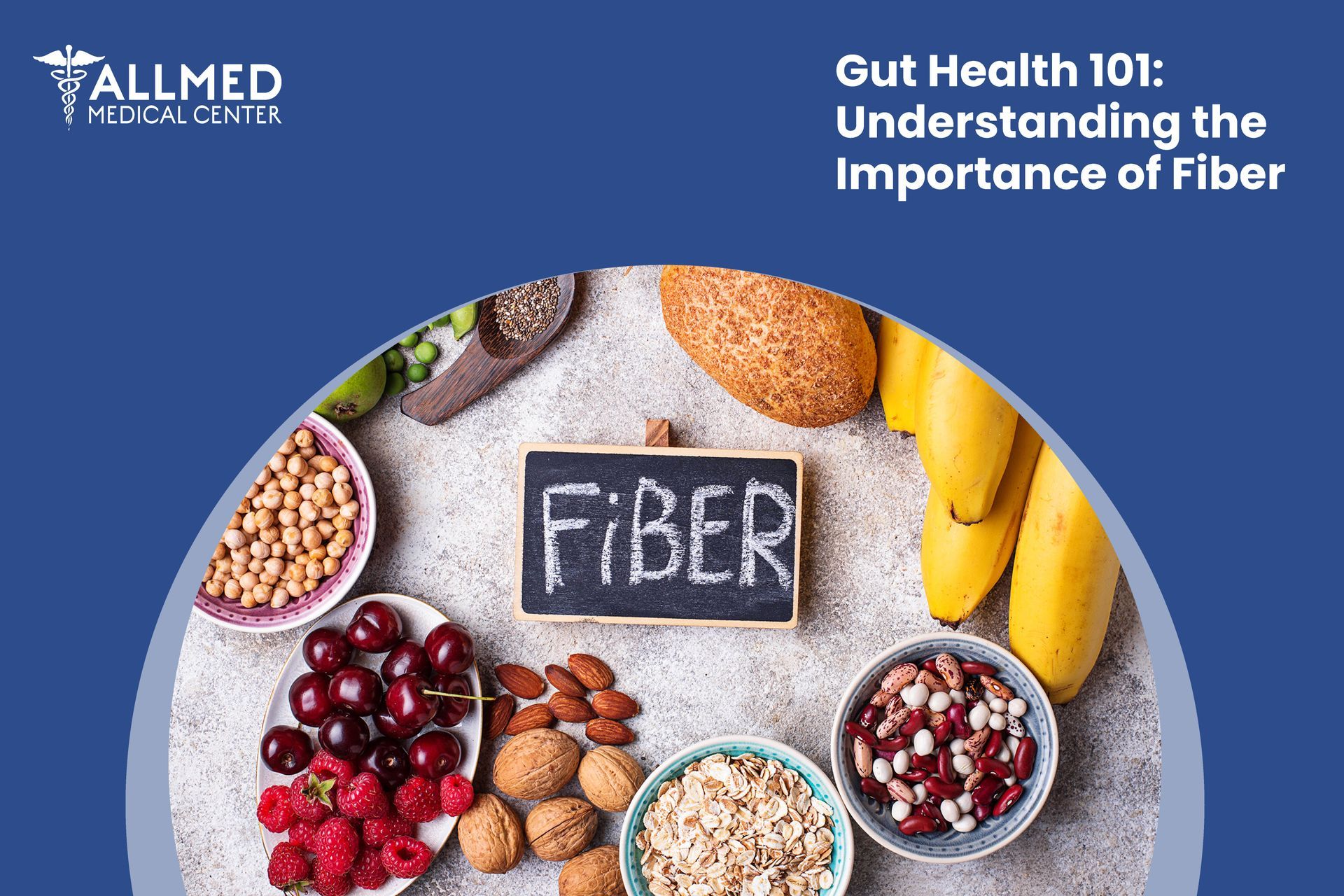
We Proudly Accept Medi-Cal and Medicare
Write your caption hereButton
Now Accepting Walk-ins!
Write your caption here

We Proudly Accept Medi-Cal and Medicare
Write your caption hereButton
Now Accepting Walk-ins!
Write your caption here

You have probably been told before to consume more fiber. But "what is fiber for?" Fiber is beneficial for your health and your digestive system in many ways. We'll discuss more in this article why fiber is essential to your gut health.
In honor of
National Fiber Focus Month, which takes place in January, we also share tips on increasing fiber intake to maintain a healthy diet.
Gut Health 101
The gut is the digestive system or gastrointestinal tract, the path food travels from your mouth to your backside. The state of optimal performance and equilibrium in the digestive tract is called "gut health."
What composes the Gut?
The name "gut" can be confusing because it is not just one large organ or conduit in the middle of your body. The digestive system facts are made up of various organs and tissues, including:
- Tongue and mouth
- Oesophagus
- Stomach
- Small intestine,
- Large intestine
- Liver, pancreas, and gallbladder anus (these are accessory organs that sit outside the digestive tract.)
Along with these organs, there are two other factors to consider regarding gut health. These two are inextricably intertwined, and when one is compromised, the other is almost certainly not far behind.
1. The Gut Lining
The gut is a hollow tube separated from the bloodstream by a fragile covering called the gut lining. The gut lining's role is to let good things in (such as nutrition) and bad things out (like harmful bacteria and undigested food).
The absorption of energy and nutrients occurs at the gut and blood junction. You will absorb less nourishment if there is inflammation or injury, which can lead to shortages.
2. Gut Microbiome
Among the essential components of your health, trillions of bacteria reside in your digestive tract, especially the large intestine. This is what the term "microbiome" refers to.
It starts to grow when you're a young child, and it has a good relationship with you. When you eat, the microbes in your gut get food. In exchange, they can help with digestion, make good things like short-chain fatty acids, and protect themselves from harm.
The Importance of the Gut
The gut is so crucial to your overall health in so many ways. It helps break down food and absorbs the energy that every cell in the body needs to work. The intestines transport the body's waste products through bowel movements.
Moreover, the gut is more than simply fuel and waste. The digestive tract
contains 70–80% of the immune system. Gut imbalances might decrease or cause overactive immunity (autoimmunity). To keep your gut healthy, you should learn why fiber is crucial.
What Does Fiber Do For Your Gut?
We will learn what fiber does and why it is crucial. We are told that commonly, fiber is classed as either soluble, which dissolves in water, or insoluble, which does not.
Soluble - A gel-like substance is created when this kind of fiber
dissolves in water. It can aid in the reduction of blood cholesterol and glucose levels.
Soluble fibers are found in:
- Oats
- Peas
- Beans
- Apples
- Citrus fruits
- Carrots
- Barley,
- Psyllium
Insoluble - Those who experience constipation or irregular stools can find this fiber helpful since it encourages the passage of material through your digestive tract and improves stool bulk.
Insoluble fibers are
found
in:
- Whole-wheat flour
- Wheat bran
- Nuts
- Legumes
- Cauliflower
- Green beans
- Potatoes
Why is fiber necessary for the digestive system? Fiber is essential to your gut health and other benefits for the following reasons:
- One of the fiber functions is it regulates bowel movements. Facts about the stomach tell us that dietary fiber softens and increases the weight and volume of your feces. An easy-to-pass stool minimizes constipation risk. By absorbing water, fiber can help firm loose, watery stools.
- Protects the health of the bowels. The purpose of fiber is that it can lessen your risk of developing colon polyps and hemorrhoids (diverticular disease). Studies suggest a high-fiber diet reduces colorectal cancer risk. Some fiber ferments in the colon.
- It promotes reaching a healthy weight if you ask, “what does fiber do for the body?” You will eat less and feel fuller longer if you consume high-fiber foods instead of low-fiber diets.
- Lowers a person's cholesterol. Bad cholesterol or low-density lipoprotein levels can be decreased by soluble fiber. This can help lower your total blood cholesterol levels. Research tells us that high-fiber foods can help your heart by reducing blood pressure and inflammation.
- Aids in blood sugar regulation. Fiber, especially soluble fiber, can help control blood sugar levels in people with diabetes by slowing the absorption of sugar. Insoluble fiber is vital to a balanced diet and helps lower type 2 diabetes risk.
- Extends your life. According to studies, increasing your dietary fiber intake, particularly from cereals, can lower your chance of dying from all malignancies and cardiovascular disease.
Consume Adequate Fiber
The US Department of Agriculture (USDA) recommends fiber consumption at 25 grams for women and 38 grams for men by the US Department of Agriculture (USDA). Some pointers for boosting fiber intake are:
- Substitute minimally processed brown rice and other whole grains like barley, millet, amaranth, farro, and pasta for white rice, bread, and noodles.
- Include high-fiber foods in your regular diet. To cereals, add 1-2 teaspoons of almonds, ground flaxseeds, or chia seeds; to casseroles, stir-fries, and soups, add chopped veggies.
- Consume whole fruits as opposed to fruit juice.
- Pick cereals with a whole grain as the first ingredient for breakfast.
- Check the Nutrition Facts label and select cereals with 20% or more of the Daily Value (DV) for fiber.
- Take a bite from a handful of almonds or crunchy raw vegetables instead of chips and crackers.
- Two to three times per week, replace the meat in soups and chili with beans or other legumes.
- Using psyllium or methylcellulose powders or wafers can help you get enough fiber. They soften and bulk stool to make it easier to pass. Also, the best way to get fiber is from food because supplements don't give you the minerals, vitamins, and other nutrients that fiber-rich foods do.
Talk to Your Doctor
AllMed Medical Center is the place to go if you're looking for "clinics near me" or "doctors in Sacramento." Your health is our doctor's priority.
Call us at 1-833-255-6332 immediately should you need your doctor's professional advice on the benefits of fiber for your gut health. You can also select from this list the clinic of your choice.
AllMed Medical CentersServing
Greater Sacramento
Allmed Medical Center | All Rights Reserved.










